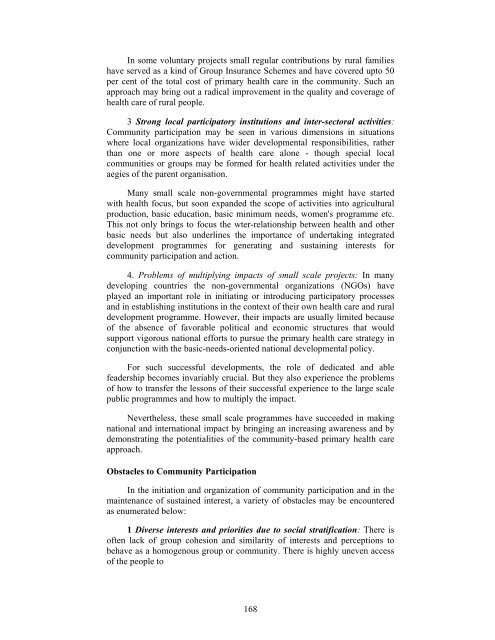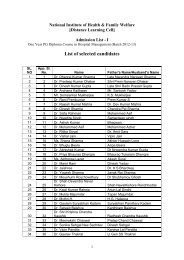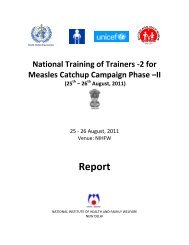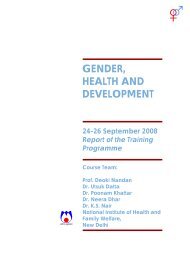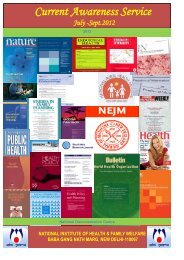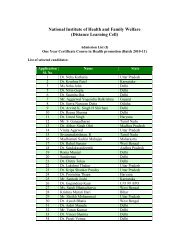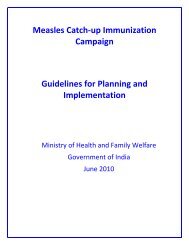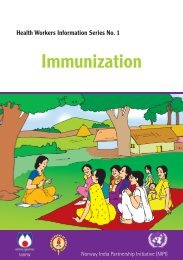COMMUNITY PARTICIPATION IN PRIMARY HEALTH CARE ...
COMMUNITY PARTICIPATION IN PRIMARY HEALTH CARE ...
COMMUNITY PARTICIPATION IN PRIMARY HEALTH CARE ...
You also want an ePaper? Increase the reach of your titles
YUMPU automatically turns print PDFs into web optimized ePapers that Google loves.
In some voluntary projects small regular contributions by rural families<br />
have served as a kind of Group Insurance Schemes and have covered upto 50<br />
per cent of the total cost of primary health care in the community. Such an<br />
approach may bring out a radical improvement in the quality and coverage of<br />
health care of rural people.<br />
3 Strong local participatory institutions and inter-sectoral activities:<br />
Community participation may be seen in various dimensions in situations<br />
where local organizations have wider developmental responsibilities, rather<br />
than one or more aspects of health care alone - though special local<br />
communities or groups may be formed for health related activities under the<br />
aegies of the parent organisation.<br />
Many small scale non-governmental programmes might have started<br />
with health focus, but soon expanded the scope of activities into agricultural<br />
production, basic education, basic minimum needs, women's programme etc.<br />
This not only brings to focus the wter-relationship between health and other<br />
basic needs but also underlines the importance of undertaking integrated<br />
development programmes for generating and sustaining interests for<br />
community participation and action.<br />
4. Problems of multiplying impacts of small scale projects: In many<br />
developing countries the non-governmental organizations (NGOs) have<br />
played an important role in initiating or introducing participatory processes<br />
and in establishing institutions in the context of their own health care and rural<br />
development programme. However, their impacts are usually limited because<br />
of the absence of favorable political and economic structures that would<br />
support vigorous national efforts to pursue the primary health care strategy in<br />
conjunction with the basic-needs-oriented national developmental policy.<br />
For such successful developments, the role of dedicated and able<br />
feadership becomes invariably crucial. But they also experience the problems<br />
of how to transfer the lessons of their successful experience to the large scale<br />
public programmes and how to multiply the impact.<br />
Nevertheless, these small scale programmes have succeeded in making<br />
national and international impact by bringing an increasing awareness and by<br />
demonstrating the potentialities of the community-based primary health care<br />
approach.<br />
Obstacles to Community Participation<br />
In the initiation and organization of community participation and in the<br />
maintenance of sustained interest, a variety of obstacles may be encountered<br />
as enumerated below:<br />
1 Diverse interests and priorities due to social stratification: There is<br />
often lack of group cohesion and similarity of interests and perceptions to<br />
behave as a homogenous group or community. There is highly uneven access<br />
of the people to<br />
168


